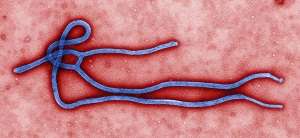 |
| Ebola virus under an electron microscope--Courtesy of CDC |
GlaxoSmithKline ($GSK) announced today that it will begin enrolling healthy patients as early as mid-September to test its investigational Ebola vaccine in clinical safety trials.
In collaboration with the National Institutes of Health's Vaccine Research Center, Glaxo will start recruiting patients in the U.K., Gambia and Mali as past of a series of safety trials. If the vaccine is shown to be safe and to elicit immune responses in patients, stakeholders want to fast-track its deployment to halt the deadly spread of the disease, which has killed more than 1,400 people in West Africa since the outbreak was first detected in March.
The trial is being kickstarted by a £2.8 million ($4.64 million) grant from several U.K. organizations--the Wellcome Trust charity, Medical Research Council (MRC) and U.K. Department for International Development (DFID).
Professor Adrian Hill, of the Jenner Institute at the University of Oxford, will lead the safety tests of the vaccine at the U.K. site, which will involve 60 healthy volunteers. Meanwhile, the Gambia and Mali trials will enroll 40 patients each, and NIH will simultaneously launch similar trials in the U.S. at the agency's National Institute of Allergy and Infectious Diseases. The collaborators hope to finish the trials by the end of the year.
Each set of volunteers will be split into groups of 20 that will receive different doses of the vaccine so researchers can determine a safe and effective dosing level.
The experimental vaccine--which GSK acquired in the $325 million buyout of Okairos in May 2013--uses a single Ebola virus protein to generate an immune response. It does not contain any infectious virus material, so trial participants are not at risk for becoming infected with Ebola.
In the U.S., NIAID will test the same vaccine as well as a related vaccine designed to protect against two strains of Ebola species--Ebola Zaire and Ebola Sudan. The Zaire strain is believed to be the most lethal among Ebola viruses and is responsible for the current outbreak.
Though not the first human vaccine trial for the virus, which causes severe hemorrhagic fever, the Glaxo studies come after mounting pressure from international health groups and governments to allow experimental treatments to be used on patients and people at risk of catching the virus. The NIAID has been working for years to develop a vaccine against the lethal disease and conducted its first clinical trial in 2003. Since then, separate research teams have carried out three other Phase I trials in 2006, 2007 and 2012, according to ClinicalTrials.gov.
Still, even if a vaccine were to prove safe in humans, lingering questions remain about who would receive the vaccine. Experts have said that it would be difficult to determine a vaccine's effectiveness at preventing Ebola until years after it's been administered.
- read the press release from GlaxoSmithKline
- get FierceBiotech's take
Special Report: The top 5 vaccine makers by 2013 revenue - GlaxoSmithKline